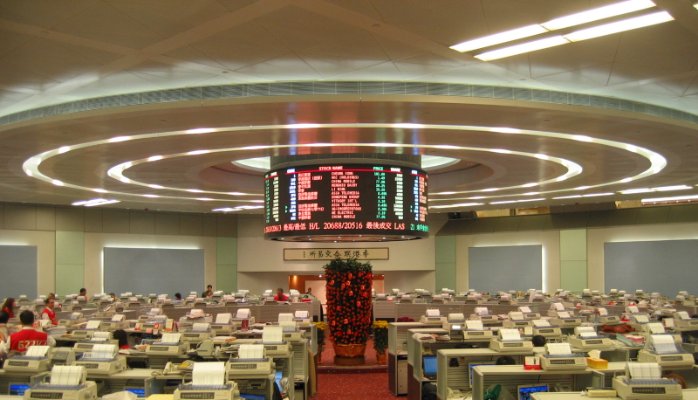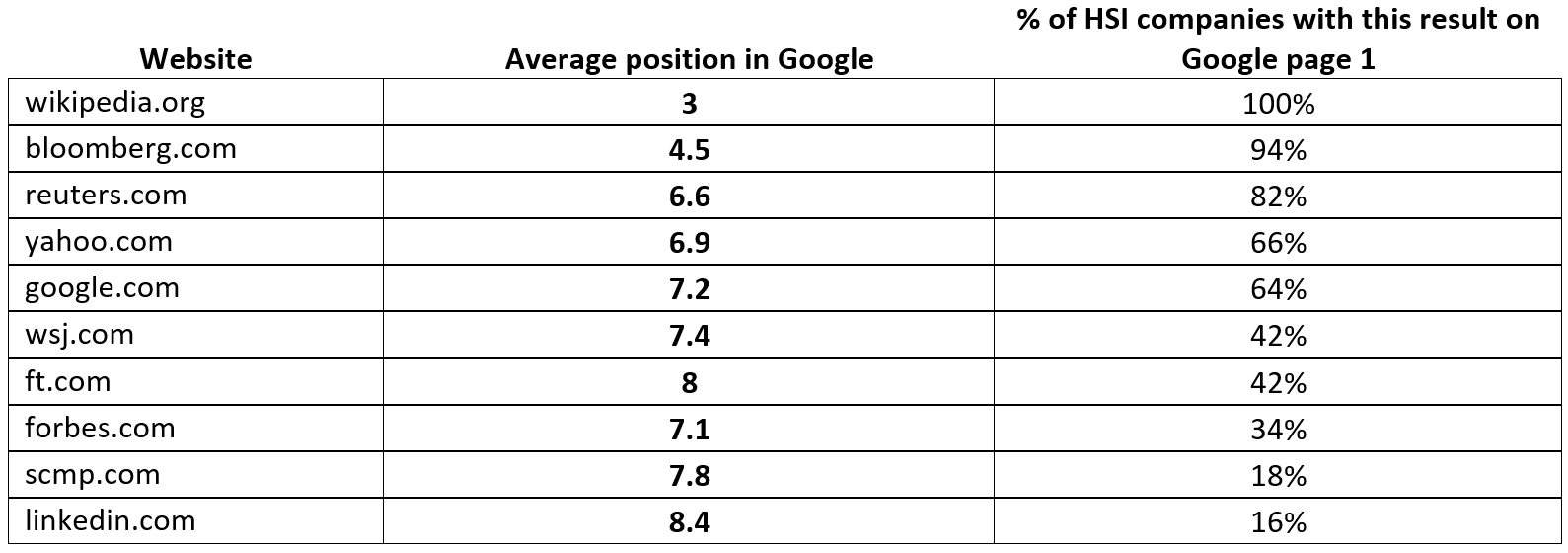Five Blocks Releases 2016 Hang Seng Index Corporate Digital Reputation Study Results
Executive Summary: Wikipedia is ubiquitous, but often sparse in content. Social media is all but missing in the digital reputation landscape. HSI companies are not engaging their stakeholders online outside of their own websites.
Five Blocks Inc., a NY-based digital reputation management company, released its 2016 Hang Seng Corporate Digital Reputation Study results, revealing the top trends seen for the companies in the Hang Seng Index (HSI). The study looked at the way in which these Hang Seng companies appear when searched in Google.com. This is generally the first impression that US and international based stakeholders get when they look at these brands.
Top appearing sites in Google.com search results:
Wikipedia and the Hang Seng
Perhaps not surprisingly, Wikipedia appears for every company on the HSI and appears at the 3rd position on average – usually after the brand’s own website. It was also interesting to note that almost half of the Wikipedia pages contain less than 400 words, meaning they are minimal in their actual content. Companies like Sun Hung Kai and BOC Hong Kong Holdings currently have the most minimalistic Wikipedia pages. At the other end of the spectrum are companies such as Bank of China, Lenovo, MTR, and Cathay Pacific, which have the longest Wiki pages. This is, perhaps, not surprising as they are consumer-facing companies.
Having a fully developed Wikipedia page helps visitors find rich, relevant information about the brand and generally leads to a positive reputation. Robust Wikipedia pages are also less susceptible to being overrun with negativity when an editor adds a new section to the page.
It is also worth noting that 11 Hang Seng companies have Wikipedia pages that contain a prominent warning message. These are typically an indication that the Wiki page is not properly constructed and maintained.
The role of LinkedIn and other social media
The majority of the top ten appearing sites for searches of the Hang Seng are news sites. In contrast, when looking at the top sites appearing for the Fortune 100, we find sites like Twitter (#2), Facebook (#3), and LinkedIn (#9). This difference indicates that the Hong Kong companies are not engaging their audiences through social media in ways that impact their digital reputation.
LinkedIn is the only social network that made the top 10 for the Hang Seng companies. While only 16% of companies had a LinkedIn result appearing on page 1, the majority have LinkedIn pages – most of them undeveloped.
While 72% of the Hang Seng companies have corporate LinkedIn pages with their company logo, only 36% have taken a more significant branding step and have also included a backsplash graphic which is far more visible than just a small logo.
Companies that are highly branded – including graphics and articles by the company – are more likely to see their LinkedIn pages rank on page 1. These companies have an average of over 100,000 followers on their LinkedIn pages, some 12 times as many as weakly branded companies.
Conclusions
HSI companies are engaging far less with Wikipedia than their US counterparts. This means that, in many cases, they are making it harder for stakeholders to find accurate and up-to-date information. By reaching out to Wikipedia editors and supplying robust, updated content these brands can be more successful in ensuring that searchers find optimal information.
As with other social media platforms, LinkedIn appears to be an underutilized platform for large Hong Kong companies. By taking control of the brand’s corporate LinkedIn page, posting images, news, and articles Hang Seng companies would be expected to increase their social media presence within their digital reputation. LinkedIn is also a platform used by many thought leaders to disseminate their articles and engage with stakeholders.
Methodology
The 2016 Hang Seng Corporate Digital Reputation Study was conducted in May 2016 by gathering and analyzing the first page of Google search results for both the companies in the HSI and the Fortune 100. Results were captured for all companies as seen on Google.com from a NY-based computer and additionally for the HSI companies, on Google.com.hk from a Hong Kong-based computer.
Search results data was collected and analyzed using the Five Blocks’ IMPACT tool. In addition, the company analyzed the Wikipedia pages of the Hang Seng companies, recording information related to word count, edit frequency, page views over the past 30 days, presence of warning messages, etc. The study also looked at the corporate LinkedIn pages of each company and analyzed the design and textual elements as well as the number of followers, to determine how they were utilizing the branding opportunities available within LinkedIn.
Full data for this study is available from Five Blocks.
All third party trademarks are the property of their respective owners. Use of such trademarks does not constitute or imply any sponsorship or endorsement.
About Five Blocks
Five Blocks is a proud sponsor of the upcoming Sohn Investment Conference to be presented by the Karen Leung Foundation in Hong Kong on June 1, 2016. Sam Michelson, the company’s CEO, will be in Hong Kong meeting with clients and partners during the first week of June.
Five Blocks provides digital reputation management services and technology for individuals, brands and companies. We utilize IMPACT, our own digital reputation dashboard, to track and analyze digital reputation and to identify risks and opportunities for our clients. We help our clients to utilize owned web sites, earned media, social media and business platforms to tell their stories. Five Blocks helps individuals and companies to enhance, protect and monitor their online reputation so that they can focus on their business.






